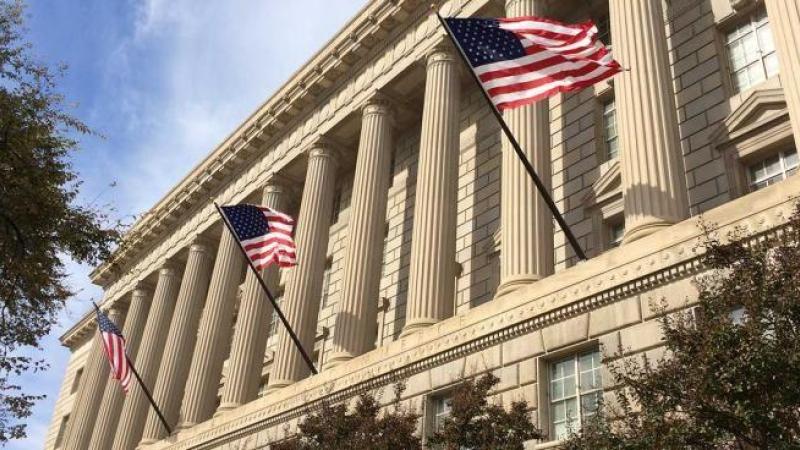Trump’s moratorium on offshore wind development gives wind industry’s opponents in blue states hope
“We have government officials, elected officials, who all want this [offshore wind development] for whatever reasons, and they have steamrolled this from the very beginning,” said Amy DiSibio, board member for Nantucket-based ACK For Whales.
Among the plethora of executive orders President Donald Trump signed after being inaugurated Monday was a withdrawal of all offshore areas for wind leasing. For the dozens of coastal grassroots community groups opposed to offshore wind, the order is welcome news.
The moratorium on wind leases prohibits any new or renewed approvals for offshore wind farms pending a comprehensive assessment of federal leasing and permitting practices. The order also directs the Secretary of the Interior to conduct a comprehensive review of the ecological, economic, and environmental necessity of terminating or amending any existing wind energy leases.
Rep. Jefferson Van Drew, R-N.J., said in a statement that he had worked closely with Trump to draft the executive order and the offshore wind projects should have never been approved.
"The Biden administration rammed them through the approval process without proper oversight, transparent lease agreements, or a full understanding of their devastating consequences. They are an economic and environmental disaster waiting to happen,” Van Drew said.
Hopeful for change
Former President Joe Biden had committed the United States to building 30 gigawatts of offshore wind by 2030. The drive to rapidly industrialize the East and West coasts in the name of “clean energy” raised concerns about the impacts of offshore wind to historical sites, fishing industry, tourism, whales and energy costs — concerns offshore wind opponents say the Biden-Harris administration consistently ignored.
When a blade splintered from a turbine off the coast of Nantucket, public support for the industry began to fall as residents picked up debris from the 60-ton blade that gradually washed up on shore in the months that followed.
Amy DiSibio, board member for Nantucket-based ACK For Whales, told Just the News prior to the inauguration that many on the island are hoping Trump will hear their concerns.
“We feel hopeful that a change in administration that appears to be more friendly to that aligns more closely with our mission with respect to offshore wind and the environment. That could be a good thing, at least,” DiSibio said.
In November, Nantucket residents voted more than 2-to-1 for Democratic candidate Kamala Harris over Trump. In 2020, nearly 3 out of every 4 votes went for Biden. While most of the island’s voters are no friend of Trump, his order is welcome for those who want their concerns about offshore wind heard.
“We have government officials, elected officials, who all want this [offshore wind development] for whatever reasons, and they have steamrolled this from the very beginning,” DiSibio said.
Federal engagement
Nantucket resident Mary Chalke has been posting videos of her collecting debris from the beaches ever since it began washing up on the shore last summer. On the six month anniversary of the incident, Chalke said in a video that they are still getting debris from the blade floating up on the beach, even though Vineyard Wind and GE Veranova, the blade manufacturer, had said in October it was taking steps to remove the blade from the seabed.
In the video Chalke said that six months after the incident, the concerned residents still don’t have answers. They haven’t been provided results from any water quality tests or assessments on the impacts of the debris on marine life. Despite lingering concerns, federal agencies in October reauthorized the permit for Vineyard Wind, and construction has resumed, including blade installation.
“They’re going full-speed ahead,” Chalke said.
The residents of Nantucket had hoped to get more information from the Bureau of Safety and Environmental Enforcement (BSEE) during a public forum on Jan. 14, hosted by the Nantucket Select Board. The BSEE required that all questions be submitted by Dec. 30, and these would be answered during the webinar.
"They agreed to come only if we submitted questions in writing. Those are the parameters of their willingness to come and meet with the public,” Select Board chair Brooke Mohr told the Nantucket Current. The BSEE was overwhelmed by the number of questions it received, and the meeting was postponed to Feb. 3. DiSibio said that BSEE had come to Nantucket in the summer, but the meeting wasn’t helpful.
“They sent in a couple administrators who essentially read their job descriptions to us. They didn’t answer any questions. It was a total waste of time,” she said.
She said the latest attempt at engagement appears just as unhelpful. The notice announcing the public forum, originally planned for Jan. 14, came on the afternoon of Christmas Eve. This gave residents until Dec. 30 to submit questions.
“You don't send this to your community on Christmas Eve in the afternoon and expect everyone to sit down and start firing off questions. And you give them a whopping six days to get it done over the busiest holiday week of the year? I think it is a slap in the face to everybody. We have been asking questions for six months and gotten almost nothing in return,” DiSibio said.
DiSibio said she expects that BSEE will “cherry pick” the questions they want to answer for the Feb. 3 webinar, which means they’ll decide which questions to ignore.
Legal challenges
ACK for Whales had filed a federal lawsuit challenging the permitting of the Vineyard Wind project, a 62-turbine wind farm 15 miles south of Martha’s Vineyard and southeast of Nantucket. It was from this project that a blade manufactured by GE Veranova shattered to bits in July.
The lawsuit argues that the agency failed to follow a requirement in the ESA to use “the best available scientific and commercial data available.” Even though analyses of the project found that it would “contribute to stressors that affect” the critically endangered North Atlantic Right Whale, and that “the loss of even one individual a year” could reduce the species’ recovery, NMFS and the Bureau of Ocean Energy Management created an exception to the ESA requirement.
In April 2024, the U.S. Court of Appeals for the First Circuit upheld a district court's decision to dismiss the suit, ruling that it had to defer to the federal agencies’ interpretation of the ESA requirements.
The group appealed to the Supreme Court. Their petition argued that the agencies didn’t consider the cumulative impacts of other planned projects when they approved Vineyard Wind, which violated the ESA.
With the ruling in Loper Bright Enterprises v. Raimondo, which overturned the "Chevron deference" allowing broad latitude in interpreting laws when Congress hasn’t provided specific guidelines — the standard the lower court cited — ACK For Whales hoped they’d be granted an opportunity for the Supreme Court to consider the merits of their case. However, the high court this month declined to hear the case.
“Obviously we're disappointed. We think the merits of our case are strong, and we don't feel like they've ever really been heard,” DiSibio said, adding that the court considers less than 1% of the cases it receives.
The denial wasn’t the end of the line for ACK for Whales. Their lawyers had filed two notices of intent to sue with the Department of Interior, over the permitting of New England Wind. DiSibio said the legal action would be more “robust” than their lawsuit against the permitting of Vineyard Wind.
ACK for Whales isn’t the only community group filing lawsuits over offshore wind projects, Restoration News reported. New Jersey-based Save LBI has filed a number of legal interventions over the Atlantic Shores Offshore Wind project planned off the coast of New Jersey.
These legal challenges will likely take some time to play out in court. While offshore wind opponents wait for rulings to come down, they can at least know that the buildout has been paused for the time being.
The Facts Inside Our Reporter's Notebook
Links
- dozens of coastal grassroots community groups
- moratorium on wind leases
- historical sites
- fishing industry
- tourism
- whales
- energy costs
- picked up debris
- ACK For Whales
- voted more than 2-to-1
- 3 out of every 4 votes
- posting videos
- said in October
- reauthorized the permit
- including blade installation
- told the Nantucket Current
- postponed to Feb. 3
- Vineyard Wind
- blade manufactured by GE Veranova
- petition
- Loper Bright Enterprises v. Raimondo
- overturned the "Chevron deference
- court considers less than 1%
- New England Wind
- Restoration News reported
- Atlantic Shores Offshore Wind
















